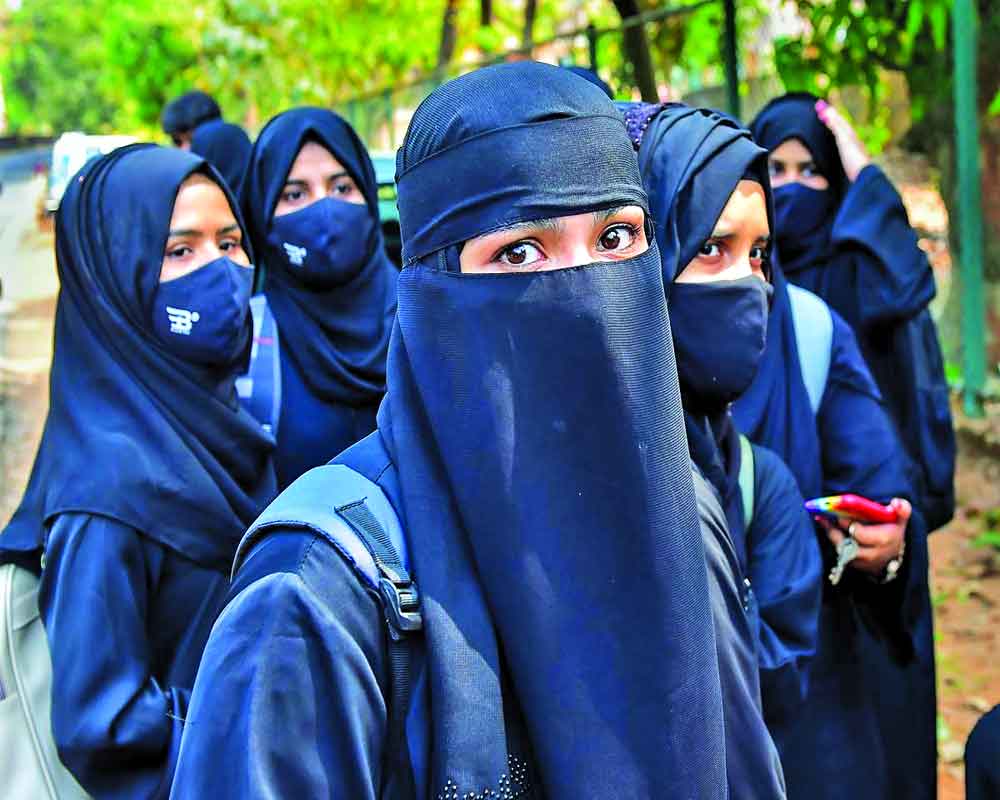Liberals are fuelling the pro-hijab agitation-almost transforming hijab, an instrument of misogyny, into a symbol of protest
The contrast between protests over the hijab in Iran and India couldn't be starker. There are valiant women and men in the Islamic Republic of Iran who are protesting against the hijab which they rightly see as a symbol and instrument of oppression of women. On the other hand, there are some very educated liberals, including women, in the secular Republic of India who is proffering very specious arguments, as we shall see, to justify the hijab.
Brave Iranian women and even schoolgirls are openly opposing the hijab. They are protesting over the death of MahsaAmini, a 22-year-old Iranian Kurd woman, who was killed by the notorious morality police last month for allegedly not following the Islamic Republic's dress code.
Since then, dozens have died, but this has not deterred the protestors. On September 27, the Iranian men's football team covered their sports jerseys in black jackets as they sang the national anthem before their practice match against Senegal in Austria, a news report said.
Rafia Zakaria, an attorney who teaches constitutional law and political philosophy, wrote in Pakistan's Dawn on September 28, "Pakistani feminists must make it their business to amplify the voices of Iranian women who are fighting and protesting and showing the world what true feminist courage means."In short, women and men in two prominent Islamic Republics (one of which came into being in the name of Islam) are protesting against the hijab. And, in India, fashionable liberals, including some Muslim women, are justifying the dress code that is intended to domesticate women.
They support the hijab in the name of women's 'choice.' As if the hijab were a badge of honour and not a symbol of misogyny and oppression!It hasn't occurred to our liberals that the so-called women's choices are often the results of religious indoctrination for centuries. It would be instructive here to know about the horrific impact that religious dogma and age-old customs have on women of all faiths. In a paper for the Indian Journal of Social work, Cromwell Crawford, Professor at the Department of Religion, University of Hawaii, described Raja Ram Mohun Roy's heroic fight for the abolition of sati.
Crawford wrote, "The Raja's anti-sati campaign began in 1811-12 while stationed in Rangpur. The fiery death of his sister-in-law (1812) forged in him a determination to save all the sisters of his land from this unworthy rite. Among his early efforts, he used to frequent the cremation grounds in the Calcutta area to dissuade women who were about to sacrifice their lives. The Asiatic Journal reports that on one occasion he got the priests to light the fire before the woman ascending the pile, hoping that the flames would intimidate her. He insisted that this procedure was directed by the scriptures. Contrary to his expectations, one of the wives courageously walked into the flames and was followed by the second. As she stood before the flames, she addressed the bystanders with great animation: 'You have just seen my husband's first wife perform the duty incumbent on her, and will now see me follow her example. Henceforward, I pray, do not attempt to prevent Hindu women from burning, otherwise, our curse will be upon you."So much for women's choices.
Even in Independent India, social reform was resisted. Hindu Code Bills, for instance, were fiercely opposed by the champions of Hindus in politics. The Hindi satirist Hari Shankar Parsai noted with astonishment that even some women were against the Bills which were intended to, and did, emancipate women!Cognisant of the hijab's nature, the Karnataka High Court rightly upheld the ban on hijab at the Government Pre-University Girls College in Udupi in March. Its verdict was challenged in the Supreme Court which heard arguments of both sides and reserved its judgment.
"We are of the considered opinion that wearing of the hijab by Muslim women does not make up an essential religious practice in the Islamic faith," the Full Bench said in the gist of its order that was read out by the Karnataka Chief Justice Ritu Raj Awasthi."We are of the considered opinion that the prescription of a school uniform is a reasonable restriction constitutionally permissible which the students cannot object to," the Bench, also comprising Justice Krishna S Dixit and Justice JM Khazi, also said.
The verdict was following the essential practices doctrine that the Supreme Court conceived in 1954 and has applied in many cases. Curbs on any religious practice which is not essential are not regarded as violations of religious rights.Liberals are unnecessarily fuelling the agitation against restrictions on hijab. Almost transforming hijab, a symbol, and instrument of misogyny, into a symbol of protest. In their universe, slavery is freedom and freedom is slavery. A very Orwellian universe indeed.
(The writer is a senior journalist and author, based in New Delhi. His latest book is 'There Is No Such Thing As Hate Speech: A case for Absolute Freedom of Expression', Bloomsbury (2017). The views expressed are personal)


























